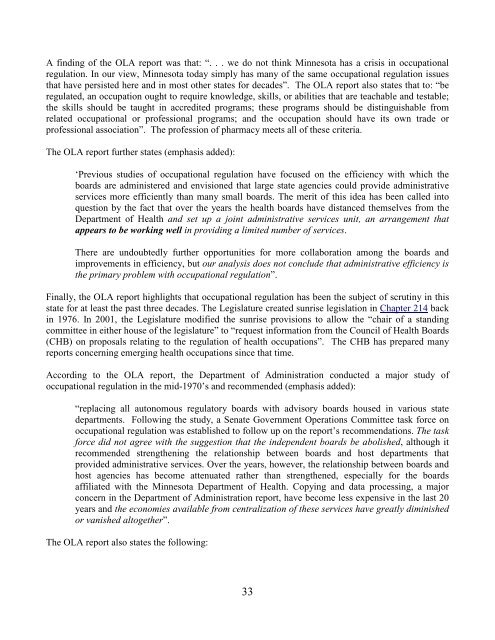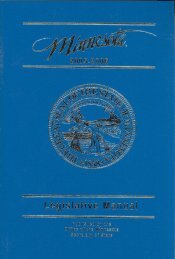Minnesota Board of Pharmacy - Minnesota State Legislature
Minnesota Board of Pharmacy - Minnesota State Legislature
Minnesota Board of Pharmacy - Minnesota State Legislature
You also want an ePaper? Increase the reach of your titles
YUMPU automatically turns print PDFs into web optimized ePapers that Google loves.
A finding <strong>of</strong> the OLA report was that: “. . . we do not think <strong>Minnesota</strong> has a crisis in occupational<br />
regulation. In our view, <strong>Minnesota</strong> today simply has many <strong>of</strong> the same occupational regulation issues<br />
that have persisted here and in most other states for decades”. The OLA report also states that to: “be<br />
regulated, an occupation ought to require knowledge, skills, or abilities that are teachable and testable;<br />
the skills should be taught in accredited programs; these programs should be distinguishable from<br />
related occupational or pr<strong>of</strong>essional programs; and the occupation should have its own trade or<br />
pr<strong>of</strong>essional association”. The pr<strong>of</strong>ession <strong>of</strong> pharmacy meets all <strong>of</strong> these criteria.<br />
The OLA report further states (emphasis added):<br />
‘Previous studies <strong>of</strong> occupational regulation have focused on the efficiency with which the<br />
boards are administered and envisioned that large state agencies could provide administrative<br />
services more efficiently than many small boards. The merit <strong>of</strong> this idea has been called into<br />
question by the fact that over the years the health boards have distanced themselves from the<br />
Department <strong>of</strong> Health and set up a joint administrative services unit, an arrangement that<br />
appears to be working well in providing a limited number <strong>of</strong> services.<br />
There are undoubtedly further opportunities for more collaboration among the boards and<br />
improvements in efficiency, but our analysis does not conclude that administrative efficiency is<br />
the primary problem with occupational regulation”.<br />
Finally, the OLA report highlights that occupational regulation has been the subject <strong>of</strong> scrutiny in this<br />
state for at least the past three decades. The <strong>Legislature</strong> created sunrise legislation in Chapter 214 back<br />
in 1976. In 2001, the <strong>Legislature</strong> modified the sunrise provisions to allow the “chair <strong>of</strong> a standing<br />
committee in either house <strong>of</strong> the legislature” to “request information from the Council <strong>of</strong> Health <strong>Board</strong>s<br />
(CHB) on proposals relating to the regulation <strong>of</strong> health occupations”. The CHB has prepared many<br />
reports concerning emerging health occupations since that time.<br />
According to the OLA report, the Department <strong>of</strong> Administration conducted a major study <strong>of</strong><br />
occupational regulation in the mid-1970’s and recommended (emphasis added):<br />
“replacing all autonomous regulatory boards with advisory boards housed in various state<br />
departments. Following the study, a Senate Government Operations Committee task force on<br />
occupational regulation was established to follow up on the report’s recommendations. The task<br />
force did not agree with the suggestion that the independent boards be abolished, although it<br />
recommended strengthening the relationship between boards and host departments that<br />
provided administrative services. Over the years, however, the relationship between boards and<br />
host agencies has become attenuated rather than strengthened, especially for the boards<br />
affiliated with the <strong>Minnesota</strong> Department <strong>of</strong> Health. Copying and data processing, a major<br />
concern in the Department <strong>of</strong> Administration report, have become less expensive in the last 20<br />
years and the economies available from centralization <strong>of</strong> these services have greatly diminished<br />
or vanished altogether”.<br />
The OLA report also states the following:<br />
33

















